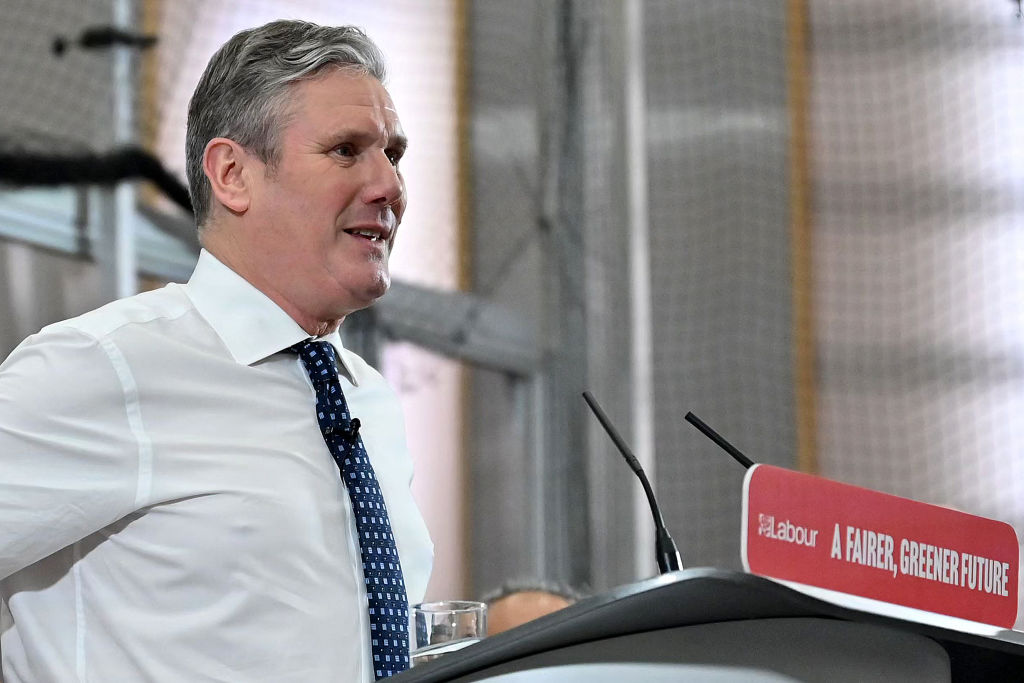Keir Starmer’s new year speech was better than Rishi Sunak’s. It’s easier to give a speech about fixing problems when you’re in opposition and someone else has caused them. But it was just more interesting than what the Prime Minister had to say yesterday. There was the politically audacious decision to pick up Vote Leave’s ‘take back control’ mantra, not just as a slogan but also in the form of a ‘Take Back Control Bill’ which will devolve new powers to local communities and give them the right to request more authority from central government. There was a rejection of the old Labour way of doing things: Starmer said he wouldn’t be get out the ‘big government chequebook’, for instance, and instead advocated a ‘partnership model’ between government and the private sector. And there was – finally – a sense that Starmer is a bit more ambitious than just winning power to fix things for a few years: he talked about a plan for a ‘decade of national renewal’.
The ‘take back control’ line allowed Starmer to set out policy, but also to appeal to the Brexit voters who disagreed with him in the 2016 campaign and turned to the Tories at the 2019 election. He said: ‘But as I went around the country, campaigning for Remain, I couldn’t disagree with the basic case so many Leave voters made to me. People who wanted public services they could rely on. High streets they could be proud of. Opportunities for the next generation. And all of this in their town or city. It was the same in the Scottish referendum in 2014 – many of those who voted ‘Yes’ did so for similar reasons. And it’s not an unreasonable demand. It’s not unreasonable for us to recognise the desire for communities to stand on their own feet. It’s what ‘take back control meant. The control people want is control over their lives and their community.’
The ‘take back control’ line allowed Starmer to set out policy and appeal to the Brexit voters who disagreed with him in 2016
The Labour leader was basically saying he doesn’t resile from his Remain position but that he wanted to offer the promises that had appealed to Leave voters. The legislation he proposes is supposed to build on the constitutional review that Gordon Brown finished before Christmas, and will give towns and cities powers to develop growth plans, to support ‘new internationally competitive economic clusters in high-value industries’ and allow local leaders to request control over economic policy making. There will be a presumption towards moving power out of Westminster. It is interesting stuff – though it’s also not a million miles away from the devolution the Tories have pursued in various guises over the past decade and a bit – and neither is it unusual for a party in opposition to promise to give away power from the centre.
Starmer looked much more comfortable than he has before, both when it came to the formal speech itself and the Q&A session afterwards. At one stage he started openly mocking the Prime Minister for listing all the things he thought were broken, before adding: ‘You’ve been in power 13 years! It’s no good coming along making five bland promises and saying, well, just give us another chance, sorry about the last 13 years.’ He offered his own experiences of a cost-of-living crisis when he was growing up, recalling having the phone cut off at home because his parents hadn’t been able to afford the bill. The Labour leader didn’t spell out what he was trying to do there, but it was a clear contrast with Rishi Sunak, whose personal wealth Starmer likes to bring up as a sign the Prime Minister is totally out of touch with normal people.
The speech was introduced by his shadow chancellor Rachel Reeves, who also emphasised the importance of fiscal restraint. She asked voters if they were better off than they were 13 years ago. Labour has asked that Reagan question of voters before when Ed Miliband was leader. But the fortunes of the two parties have changed a lot since then. One looks confident that it can win and do a better job. The other is hoping that things can only get better so voters might give it another five years.







Comments